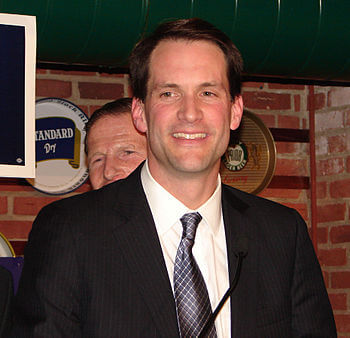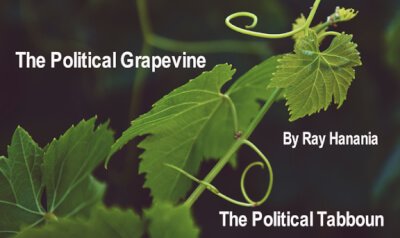HEADLINES: Himes questions troop deployment to Syria; Lawyers Without Borders demands release of Raïf Badawi from Saudi custody; UN Committee explores discrimination against Women in Lebanon, United Arab Emirates and Malawi; Holy Land Principles appeals to Cisco prior to Nov. 19 meeting
Himes questions troop deployment to Syria without AUMF, Cites lack of overarching strategy, goals

Congressman Jim Himes (CT-4), member of the House Permanent Select Committee on Intelligence, released the following statement on President Obama’s announcement of the deployment of American troops to Syria:
“President Obama’s decision to put approximately 50 American troops on the ground in Syria is troubling. We continue, without obvious success or strategy, to fight on both sides of a messy, Middle Eastern civil war. In any event, the commitment of American soldiers into combat requires an Authorization for the Use of Military Force from Congress, which has not been passed.
“Escalating the violence in the region will worsen the refugee crisis and complicate a picture that already involves Syrian troops loyal to Assad, rebel fighters, ISIL, Russia, Iran, Turkey and Kurdish forces, many working at cross-purposes. Instead, we should be moving toward a diplomatic solution through international negotiations by all of the nations with interests in the region. I have introduced a resolution in Congress calling on the Administration to do just that, and written a letter to the President with 54 other members of Congress urging the same. I hope the President will respond by focusing on diplomacy.”
The Raïf Badawi case: Lawyers Without Borders unveils the written argument sent to Saudi Arabia and calls on Canada and the international community to demand his release
Lawyers Without Borders Canada (LWBC) unveiled today the written argument in support of the release of Raïf Badawi. This written argument was sent on August 15 last to the Embassy of Saudi Arabia in Canada and to the Saudi Minister of Justice. No response has been forthcoming.
The factum was also communicated to various international and regional human rights institutions:, the President of the United Nations Committee against Torture, the Special Rapporteur on torture and other cruel, inhuman or degrading treatment or punishment, the Special Rapporteur on the promotion and protection of the right to freedom of opinion and expression, the Special Rapporteur on the situation of human rights defenders, the Working Group on Arbitrary Detention, the Arab Human Rights Committee and the Organisation of Islamic Cooperation.
The factum was prepared with the collaboration of the Quebec Bar, the Lavery law firm and recognized experts in the areas of human rights and Islamic law.
“The legal work carried out by LWBC and its partners reveals that Saudi Arabia violated the rights of Mr. Badawi, as well as its national and international obligations in three specific areas: the right to a fair trial, the right to liberty of expression and opinion and the absolute ban on torture and cruel, inhuman or degrading treatment.” commented Mr. Pascal Paradis, Executive Director of LWBC.
Mr. Badawi, who received on October 29 last the Sakharov Prize for liberty of expression awarded by the European Parliament, is still imprisoned in Saudi Arabia. “LWBC hopes that this argument will constitute an additional contribution towards Canada and the international community urging Saudi Arabia to comply with its obligations – both under Saudi and International law – by releasing Raïf Badawi forthwith and allowing him to reunite with his family in Canada.” concluded Mr. Paradis.
Civil Society stakeholders brief Committee on the Elimination of Discrimination against Women in Lebanon, United Arab Emirates and Malawi
The Committee on the Elimination of Discrimination against Women this afternoon met with representatives of non-governmental organizations to hear information on the situation of women in Lebanon, the United Arab Emirates and Malawi, whose reports will be considered during the second week of the session. A representative of the Malawi Human Rights Commission also spoke.
Representatives of non-governmental organizations in Lebanon raised the issues of the prohibition of civil marriage in Lebanon, the inability of women to pass their nationality to their children, marital rape, and the severe under-representation of women in decision-making. Problems of the abuse of domestic migrant workers and the acquittal of rapists were also raised.
Civil society representatives from the United Arab Emirates highlighted the mistreatment and arbitrary detention of political opponents, including women, who were often placed under travel bans and denied the right to education. The abuse of domestic workers was also raised. The “Islamic law” was often misinterpreted and misused by the authorities.
Speakers from civil society in Malawi and the Malawi Human Rights Commission pointed at the discriminatory provisions of the Citizenship Act, problems with accessing formal justice, inadequate health care, unfavourable provisions for rural women in customary law, and the age of marriage.
Non-governmental organizations from Lebanon included the Committee for the Follow-up on Women’s Issues, KAFA Violence & Exploitation, Avenir Liban and Human Rights Watch. International Centre for Justice and Human Rights, Human Rights Watch and Musawah spoke about the situation of women in the United Arab Emirates, while the situation in Malawi was addressed by the Women’s Legal Resources Centre, Gender Coordination Network and the Catholic Commission for Justice and Peace. A representative of the Malawi Human Rights Commission also spoke.
The Committee will reconvene in public on Tuesday, 3 November at 10 a.m., to begin its consideration of the combined fourth and fifth periodic report of Lebanon (CEDAW/C/LBN/4-5).
Statements by Non-governmental Organizations
Lebanon
A representative of the Committee for the Follow-Up on Women’s Issues said that marriage, divorce, custody and inheritance in Lebanon were still subject to the laws of the 18 different confessions and sects, constituting flagrant discrimination between men and women. Nonetheless, a slight change had taken place in 2013, when the first civil marriage had been registered in Lebanon. Regrettably, the decision on registering civil marriages had been revoked, for which the Government should be held. Lebanese women were still not capable of passing their citizenship to their children and spouses. Women made up only 3.13 per cent of Members of Parliament.
KAFA Violence & Exploitation stated that the law to protect women from family violence had been enacted in 2014, but lacked a gender perspective. Instead of criminalizing marital rape, the law only criminalized the use of violence or threat to get what religious groups called “marital rights”. Economic violence was also not defined, and a husband who confiscated his wife’s money or property was exempted from punishment. Parliament was currently discussing a draft law to regulate the marriage of minors through obtaining a prior authorization of a judge at a juvenile court. The law, nonetheless, did not prevent early marriages, where some sects allowed the marriage of girls at the age of nine. Traffickers were not held accountable for their crimes.
A speaker for Avenir Liban stressed the necessity of establishing a Ministry of Women’s Affairs in Lebanon, which would ensure that women’s rights would be dealt with in a more comprehensive and systematic manner. It would establish a stronger protection mechanism. Lebanon had to abolish article 522 of the Penal Code that allowed rapists to be acquitted from their perpetrated act by marrying their victim. Legal aid access had to increase, and a special fund was needed to help women in need to have access to legal aid.
Human Rights Watch said that there were an estimated 250,000 domestic workers in Lebanon, many of whom were women. The visa sponsorship system tied migrant workers to their employers, thus increasing the risk of the workers’ abuse. If they decided to leave, they could lose their legal status and be deported. A number of domestic workers died every year. The judicial system was largely inaccessible and unresponsive; the police and the judicial authorities frequently ignored complaints submitted by domestic workers.
United Arab Emirates
International Centre for Justice and Human Rights said that the United Arab Emirates applied double standards when it came to the rights of women, as it did with all human rights in general. Women tried within the “UAE 84” group had been subjected to travel and job bans despite their acquittal. A number of girls were banned from continuing their education because of the political affiliation of their fathers. An example was given of three sisters – Asma, Mariam and Alyaziah Khalifa Al-Suwaidi – who had disappeared for three months; they had been kept in a secret prison and denied their rights to consult a lawyer. All prisoners of conscience and political prisoners tried unfairly should be released.
Human Rights Watch stated that the United Arab Emirates had failed to adequately protect migrant female domestic workers from abuse by their employees and recruitment agents. Most of the interviewed domestic workers reported that their passports had been confiscated, and some had to work up to 21 hours per day. There was no minimum wage for domestic workers in the country, and they often received far less salary than promised. Domestic workers who sought redress had to overcome a host of legal and practical obstacles. The United Arab Emirates had no specific law on domestic violence. Women who had suffered rape faced the risk of being charged with sexual relations outside of marriage if they reported the crime.
A representative of Musawah informed that there were juristic tools and concepts that existed within Muslim legal theory that could be used to reform discriminatory Muslim laws. Much of what was deemed to be “Islamic law” by the State party today was in fact fiqh – jurisprudence, not a divine law, but human-made and fallible. The question was whether the State party had the political will to end discrimination against women and its convenient use of Islam to justify male authority over women.
Malawi
Women’s Legal Resources Centre said that Malawi was a dualist State, yet 28 years after ratifying the Convention, women could still not invoke it in domestic courts because the State had not passed legislation to fully domesticate it. There had been a dramatic decrease of the share in the national budget dedicated to gender, children and social welfare – it stood at only 0.36 per cent in the 2014/2015 budget. Women largely continued to access justice through informal channels rather than formal ones due to a number of factors, including long distances to the courts and lack of resources, among others.
A speaker from the Gender Coordination Network said that women made up only 15 per cent of the Cabinet and only 16.5 per cent of Members of Parliament. The common law rule that a married woman’s domicile was dependent on the husband still applied to date, which was discriminatory, and the Government ought to fast-track the amendment of the Citizenship Act. There was also a minimal commitment by the Government to practically address sexual and gender based violence in schools; more resources had to be allocated in that regard.
Catholic Commission for Justice and Peace explained that Malawi did not have specific acts to address access, ownership and control of customary land for women. The Government should roll out the social cash transfer programme in all districts. There was disharmony of laws regulating the minimum age of marriage, and the Government should be asked to facilitate the harmonization of the laws, which should help strengthen the fight against child marriage.
Questions by Committee Experts
On Lebanon, an Expert asked about the application of the Security Council resolution 1325. What was the current status of the National Commission for Women? Did women in rural areas enjoy the right to land ownership and could land inheritance be passed on to women?
Another Expert raised the question of access to justice in Malawi. Was there an effort by the State party, even in a nascent stage, to eliminate the problem of informal access to justice? Could it be affirmed that Malawi women would no longer have their nationality revoked if they married foreign men? The review of the Public Health Act was brought up by an Expert, who also asked about the status of abortion.
Replies by the Non-governmental Organizations
A civil sector representative from Lebanon said that the National Commission could not bring forward laws on personal and civil status. It did not have an executive authority, which was why a full-fledged Ministry on women’s rights was needed. Resolution 1325 had not been disseminated on a large scale, and no measures had been taken on its implementation. During the armed conflict, the resolution had not been taken into consideration either.
Another speaker said that there were no laws allowing women in rural areas to own land. Muslim women did not enjoy the same inheritance rights as men; sometimes women were forced to give up their inheritance in favour of their brothers.
A non-governmental organization from Malawi responded that the State party failed to trace women who married foreign citizens. A law should be in place to protect those women. Most women accessed the informal justice system, which was often able to respond to their needs. Chiefs often performed the role of local courts.
Statement by a Representative of the Malawi Human Rights Commission
A representative of the Malawi Human Rights Commission said that it was regrettable that Malawi had not yet ratified the Optional Protocol. The Government was, nonetheless, commended for various gender-related laws. There was still a significant gap with respect to the translation of the provisions of law into reality, manifested through gender inequalities existing in all sectors. The Constitution and the Gender Equality Act had not adopted the definition of discrimination as provided in the Convention. The Government was urged to put in more measures and efforts to ensure that the legal and policy frameworks were in tandem with the Convention.
There were still gaps in the numbers of women and men in decision-making positions and in the political arena. There were numerous social, religious, traditional and cultural practices which promoted the notion of inferiority of women and reinforced the superiority of men. While the State party was commended for the enactment of the Trafficking in Persons Act, more awareness ought to be raised. The Government should expedite the process of reviewing the Citizenship Act with the aim of repealing its discriminatory provisions. Availability, accessibility and acceptable health care services remained a major challenge for women in Malawi due to numerous shortages. Customary law reinforced discriminatory practices for rural women when it came to owning and controlling land.
Holy Land Principles appeals to Cisco prior to Nov. 19 meeting
In the countdown to the Cisco Shareholder’s Annual Meeting on November 19, investors are coming under increased appeals to vote for the resolution on the Holy Land Principles— an 8-point corporate code of conduct for American companies doing business in Israel-Palestine.
The Holy Land Principles—launched on International Human Rights Day, December 10, 2012— are modeled on the Mac Bride Principles that have proved to be so effective in promoting fair employment in Northern Ireland. 116 American companies have signed the Mac Bride Principles.
Fr. Sean Mc Manus, President of the Capitol Hill-based Irish National Caucus and Holy Land Principles, Inc., said: “With the precedence of 116 American companies signing the Mac Bride Principles, how can any company have problems with signing the Holy Land Principles? That is the question I urge Cisco investors to ask in good faith. I know this issue is sensitive but fair is fair. Investors cannot continue to ignore the elephant in the room. Now that this issue (fair employment by American companies doing business in the Holy Land) has been finally raised, how in justice and fairness, can it be ignored? Especially since Cisco’s own 2012 Corporate Sustainability Report admits the shocking fact that while Arabs make up 20 percent of the population in Israel they are less than 0.4 percent of the high tech industry workforce. Surely investors who believe in corporate responsibility and responsible investment cannot continue to ignore this? And surely investors can now see that the Holy Land Principles are practical and particularized way of implementing the Ruggie Principles, which Cisco states it supports?”
Fr. Mc Manus continued: “The Holy Land Principles are pro-Jewish, pro-Palestinian and pro-company. The Principles are a perfect way for Cisco to send a clear message that it wants to do the right thing—to demonstrate it wants to practice fair employment in its operations in the Holy Land. Who could argue against that?”
Barbara Flaherty, Executive Vice President of Holy Land Principles, Inc. said: “We look forward to moving the Resolution at Cisco’s Annual Meeting on November 19 at 10 AM (PST) in San Jose, California. We have faith in the fairness of the American people and in Cisco’s investors. We respectfully urge all investors to vote for the Holy Land Principles.”
Click here to see text of Resolution.
Make a DIFFERENCE in your media
 Check out our new book: “PoweR PR: Ethnic Activists Guide to Strategic Communications” … why let the news media control your life and mind. Take control.
Check out our new book: “PoweR PR: Ethnic Activists Guide to Strategic Communications” … why let the news media control your life and mind. Take control.

- Israelisnipers shooting and killing hospital workers in Gaza - December 11, 2023
- CAIR Condemns Israeli Executions of Wounded, Unarmed Palestinian in West Bank - December 11, 2023
- Arab and Muslim American voters face a “simple choice” between Biden’s inhumanity and Trump’s edgy politics - December 9, 2023
















